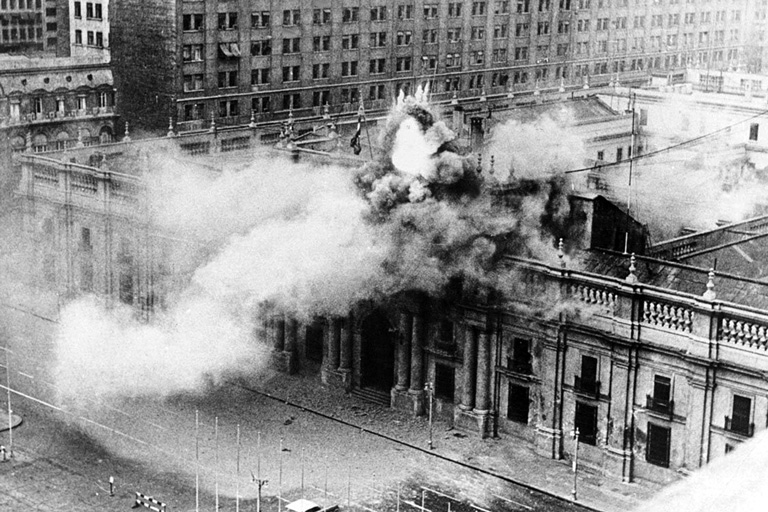
Raul Zibechi
The coup d’état of September 11, 1973 against the government of Salvador Allende marked a profound turning point in recent history. The nation-states were totally remodeled by the ruling classes, neoliberalism was instituted, putting an end to the industrial process of import substitution, and the movements from below could no longer operate in the same way. Changes that need to be evaluated.
With the military regime of Augusto Pinochet, the armed forces crushed workers’ organization, imposing State terrorism against any dissident and, in particular, against workers. They succeeded in re-founding Chilean capitalism, eliminating the old industry and intensifying accumulation by dispossession. Labor relations were completely remodeled in favor of the bosses, since there was no organized workers’ opposition.
Neoliberalism thrived on violence against the popular sectors and, with the help of technocrats and economists known as the Chicago Boys, turned Chile into a great laboratory where privatizations were practiced by the handful (except for the copper company, whose profits went to the armed forces), a new private pension system and initiatives that condemned the working class to unemployment and hunger.
Wages fell precipitously all over the world.
Two researchers from the U.S. Economic Policy Institute’s Program on Race, Ethnicity and the Economy studied 85 years of minimum wage history. Their conclusion is damning: With no mechanism in place to automatically adjust to rising prices, the real value of the federal minimum wage has gradually declined, reaching its lowest level in 66 years in 2023 (https://goo.su/7ke8mG).
This year the minimum wage is worth 42 percent less than in 1968, which was its highest point, and 30 percent less than when it was last increased 14 years ago, in 2009. This significant loss of purchasing power means that the current federal minimum wage is nowhere near a living wage, the researchers conclude.
The third issue is transformations in collective action. The center of the Chilean social movement shifted from the factories to the towns, which since 1983 have been the protagonists of resistance to the dictatorship in memorable days of protest. There, collective practices for survival, soup kitchens, which would later be theorized as solidarity economy, expanded. The movement of residents moved from resistance to insurrection.
The first protest was on May 11, 1983, called by copper workers and led by neighborhoods such as La Victoria, where barricades were erected, there were clashes with the Carabineros and the military, resulting in several deaths. In retaliation, 5,000 houses were raided and everyone over 14 years of age was arrested.
Accounts of the time emphasize the importance of the towns: Protests are repeated almost every month for the next two years. Repression becomes increasingly intense. During the fourth protest on August 11 and 12, 1983, 18,000 armed men took over the streets of the city, acting with a clear plan to establish a logic of war (https://goo.su/A8pnI). The repression left 29 dead, 200 wounded and a thousand arrested in only two days.
The protests continued almost without interruption until July 1986, combining demonstrations, rallies, bonfires and tributes to the fallen. Little by little, the youth and neighborhood organizations of the towns took the leadership of the movement, according to the aforementioned report. But, at the same time, the movement was acquiring a clear insurrectionary tinge, the youths carried weapons in the light of day in several towns, protected by the neighborhood.
The mobilizations of the towns changed the common understanding of protest, to the point that the researcher Patricio Quiroga points out: Without a call, people still demonstrated (https://goo.su/foz0). Repression put limits to resistance, but the dictatorship was weakened. Both factors were used by the center-left parties that turned the National Days of Protest into an electoral mass-maneuver.
A pattern of action emerged that is repeated to this day, as happened with the revolt of 2019, in which the region participates.
Those from below overwhelm the call of the trade union and social institutions. They move from resistance to more offensive forms, reaching almost insurrectionary confrontation with forms of self-defense (armed organizations in the 80s and front lines in 2019). Then come the parties and caudillos who surf the people’s blood and pain to impose solutions that leave everything as it was.
Let us recover our memory, so as not to keep stumbling over the same opportunism.
Published in La Jornada on Friday, September 8th, 2023. https://www.jornada.com.mx/2023/09/08/opinion/015a1pol#texto
English translation by Schools for Chiapas.
